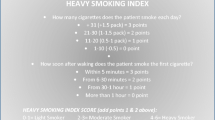Abstract
Although evaluations of tobacco and substance use disorders (SUDs) are required before bariatric surgery, the impact of these factors on postsurgical outcomes is unclear. This study describes (1) the prevalence of tobacco and SUDs in 61 veterans undergoing bariatric surgery, (2) associations between presurgical tobacco use and postsurgical weight loss, and (3) relationships between presurgical SUDs and postsurgical weight loss. Height, weight, tobacco, and SUDs were assessed from medical charts at presurgery and 6, 12, and 24 months postsurgery. Thirty-three patients (55%) were former or recent tobacco users; eight (13%) had history of SUDs. All patients who quit smoking within 6 months before surgery resumed after surgery, which was associated with increased weight loss at 6 and 12 months. Presurgical SUDs were related to marginally worse weight loss at 12 and 24 months. Bariatric surgery candidates with history of smoking and/or SUDs might benefit from additional services to improve postsurgical outcomes.
Similar content being viewed by others
References
Christiansen T, Bruun JM, Madsen EL et al. Weight loss maintenance in severely obese adults after an intensive lifestyle intervention: 2- to 4-year follow-up. Obesity 2007;15: 413–20.
Garb J, Welch G, Zagarins S et al. Bariatric surgery for the treatment of morbid obesity: A meta-analysis of weight loss outcomes for laparoscopic adjustable gastric banding and laparoscopic gastric bypass. Obesity Surgery 2009;19: 1447–1455.
Jeffery RW, Epstein LH, Wilson GT et al. Long-term maintenance of weight loss: Current status. Health Psychology 2000;19(1) (suppl): 5–16.
Ryan DH, Johnson WD, Myers VH et al. Nonsurgical weight loss for extreme obesity in primary care settings: Results of the Louisiana obese subjects study. Archives of Internal Medicine 2010;170: 146–54.
Bauchowitz AU, Gonder-Frederick LA, Olbrisch M et al. Psychosocial evaluation of bariatric surgery candidates: A survey of present practices. Psychosomatic Medicine 2005;67: 825–32.
Dziurowicz-Kozlowska AH, Wierzbicki Z, Lisik W et al. The objective of psychological evaluation in the process of qualifying candidates for bariatric surgery. Obesity Surgery 2006;16: 196–202.
Heinberg LJ, Ashton K, Windover A. Moving beyond dichotomous psychological evaluation: the Cleveland Clinic Behavioral Rating System for weight loss surgery. Surgery for Obesity and Related Diseases 2010;6: 185–190.
Mauri M, Rucci P, Calderone A et al. Axis I and II disorders and quality of life in bariatric surgery candidates. Journal of Clinical Psychology 2008;69: 295–301.
Department of Veterans Affairs. Veterans Health Administration Handbook 1102.6: Criteria and Standards for Bariatric Surgery. Washington, DC: Veterans Health Administration; September 8, 2005.
Blackburn GL, Hutter MM, Harvey AM et al. Expert panel on weight loss surgery: Executive report update. Obesity 2009; 17: 842–862.
Das S, Kinsinger LS, Yancy WS et al. Obesity prevalence among veterans at Veterans Affairs medical facilities. American Journal of Preventive Medicine 2005;28: 291–94.
Brown DW. Smoking prevalence among US veterans. Journal of General Internal Medicine 2010;25: 147–49.
Wagner TH, Harris KM, Federman B et al. Prevalence of substance use disorders among veterans and comparable nonveterans from the National Survey on Drug Use and Health. Psychological Services 2007;4: 149–57.
Safadi BY, Kieran JA, Hall RG et al. Introducing laparoscopic Roux-en-Y gastric bypass at a Veterans Affairs medical facility. The American Journal of Surgery 2004;188: 606–10.
Levine MD, Kalarchian MA, Courcoulas AP et al. History of smoking and postcessation weight gain among weight loss surgery candidates. Addictive Behaviors 2007;32: 2365–71.
Gravante G, Araco A, Sorge R et al. Wound infections in post-bariatric patients undergoing body contouring abdominoplasty: The role of smoking. Obesity Surgery 2007;17: 1325–31.
Livingston EH, Arterburn D, Schifftner TL et al. National surgical quality improvement program analysis of bariatric operations: Modifiable risk factors contribute to bariatric surgical adverse outcomes. Journal of the American College of Surgeons 2006;203: 625–33.
Zhang W, Mason EE, Renquist KE et al. Factors influencing survival following surgical treatment of obesity. Obesity Surgery 2005;15: 43–50.
Kalarchian MA, Marcus MD, Levine MD et al. Psychiatric disorders among bariatric surgery candidates: Relationship to obesity and functional health status. American Journal of Psychiatry 2007;164: 328–34.
Kessler RC, Berglund P, Demler O et al. Lifetime prevalence and age-of-onset distributions of DSM-IV disorders in the National Comorbidity Survey Replication. Archives of General Psychiatry 2005;62: 593–602.
Kalarchian MA, Marcus MD, Levine MD et al. Relationship of psychiatric disorders to 6-month outcomes after gastric bypass. Surgery for Obesity and Related Diseases 2008;4: 544–49.
Clark MM, Balsiger BM, Sletten CD et al. Psychosocial factors and 2-year outcome following bariatric surgery for weight loss. Obesity Surgery 2003;13: 739–745.
Heinberg LJ, Ashton K. History of substance abuse relates to improved postbariatric body mass index outcomes. Surgery for Obesity and Related Diseases 2010;6: 417–21.
McCool RM, Richter KP. Why do so many drug users smoke? Journal of Substance Abuse Treatment 2003;25: 43–49.
Bush K, Kivlahan DR, McDonnell MB et al. The AUDIT Alcohol Consumption Questions (AUDIT-C): An effective brief screening test for problem drinking. Archives of Internal Medicine 1998;158: 1789–95.
Deitel M, Greenstein RJ. Recommendations for reporting weight loss. Obesity Surgery 2003; 13: 159–60.
U.S. Department of Health and Human Services Series 10: Data from the National Health Interview Survey, No. 249. 2010; Retrieved February 13, 2011 from http://www.cdc.gov/nchs/data/series/sr_10/sr10_249.pdf.
Conflicts of interest
None
Author information
Authors and Affiliations
Corresponding author
Additional information
This work was carried out while the first author was a resident in Clinical Psychology at the G.V. (Sonny) Montgomery VA Medical Center, 1500 E Woodrow Wilson Dr, Jackson, MS 39216.
Rights and permissions
About this article
Cite this article
Adams, C.E., Gabriele, J.M., Baillie, L.E. et al. Tobacco Use and Substance Use Disorders as Predictors of Postoperative Weight Loss 2 Years After Bariatric Surgery. J Behav Health Serv Res 39, 462–471 (2012). https://doi.org/10.1007/s11414-012-9277-z
Published:
Issue Date:
DOI: https://doi.org/10.1007/s11414-012-9277-z




